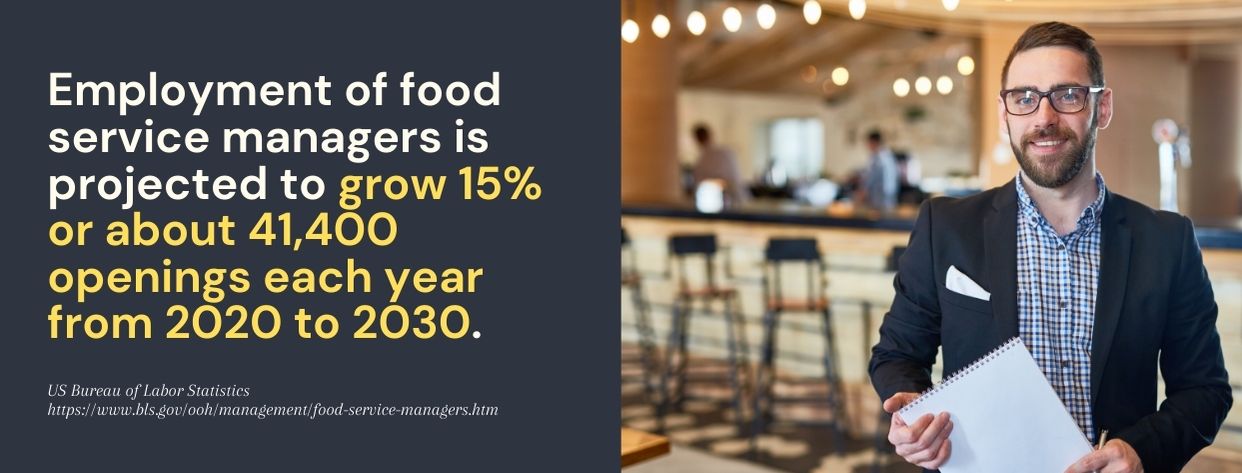Find Your Perfect Business Degree
www.business-management-degree.net is an advertising-supported site. Featured or trusted partner programs and all school search, finder, or match results are for schools that compensate us. This compensation does not influence our school rankings, resource guides, or other editorially-independent information published on this site.
Food industry management jobs allow employees to work in food service but in a managerial capacity. As always, management positions allow for higher salary opportunities and job promotions.
They are responsible for the day-to-day operations of restaurants and other establishments that serve food and beverages. In performing their managerial job duties, today’s food industry workers deal with the pressure to keep up with fast-changing consumer trends.
As food companies are on their toes to stay visible and relevant to their market, food industry managers are keeping pace with modern customer needs. Serving food to millennials, for one, can be tricky as they prefer to spend their money on “experience” rather than objects. For this reason, small businesses that offer local authentic food and products have taken the spotlight in recent years.

Food and Technology
Many companies in the food industry have explored ideas to combine consumer needs with technological advancements in an effort to provide more convenient access to food services. Today, it takes no more than just a click or a tap on a smartphone to order food, grocery shop, or check social media for food adventures. Ensuring that all these elements are in place is one of the critical managerial job duties in the food industry.
Job Outlook
There are many food industry management jobs to consider. The restaurant industry is second on the list of the largest employers in the United States. The Bureau of Labor Statistics projects that food service occupations will not change over the next 10 years with a 0% job outlook rate. Employers in this industry are looking for qualified individuals with precise operations and management skills.

Top 10 Food Industry Management Jobs and Duties
Kitchen Manager

Perhaps one of the most popular food industry management jobs to consider is the Kitchen Manager.
A Kitchen Manager is responsible for “back of the house” operations. It is their job to hire and supervise kitchen staff, purchase food supplies, and ensure the proper training of all staff to execute techniques according to food preparation, cooking, and safety standards.
Teamwork is a top priority for kitchen managers. They need to coordinate with everyone involved in the kitchen area to make sure the food looks good, all orders are served on time, and customer complaints are handled efficiently. Also associated with the role of a kitchen manager includes:
- purchasing,
- inventory,
- scheduling,
- hiring,
- and firing.
The typical educational requirement for kitchen managers is a high school diploma or equivalent, although there are many useful degree programs available. Interested kitchen managers can enroll in marketing, food costs, vendor contracts, and management courses to gain the skills they need to succeed at their jobs.
Five years of work experience is typically required to land this position. There is no formal education needed, but if you want to get a shot at career advancement, you have to obtain certifications from culinary arts schools or technical schools.
There’s an option to open up your own restaurant after gaining experience as a kitchen manager for some years. In order to acquire management skills, prospective restaurant owners should also consider studying disciplines such as accounting, communication, and business administration.
To be considered for one of the top food industry management jobs, you should secure the proper certifications. You can acquire a Food Protection Manager Certification (FPMC) by passing a food safety exam at the American National Standards Institute. You also need to have supervisory experience in food service and specialized training in food safety.
Kitchen managers’ median annual pay is $61,310 ($29.48 per hour).
Executive Chef

Executive Chef is one of the most challenging positions in the food industry, but it is one of the most coveted jobs.
An executive chef must possess strong management and customer service skills. You will need to have a degree in culinary arts or have a lot of experience in the field. Ingenuity at work and full compliance with food hygiene standards are also essential in becoming an executive chef.
As head of the kitchen, the executive chef is expected to:
- Oversee the food preparation and provision of safe, healthy, and well-presented food
- Design a food and beverage; present aesthetically pleasing
- Ensure safety and sanitation of the work environment
- Plan menu
- Keep track of the budget
- Direct equipment maintenance
- Take charge of payroll, food costs, and other pertinent kitchen and staff records
- Make administrative decisions such as hiring new kitchen personnel
- Supervise work performance, give reviews, and take disciplinary actions
Given these numerous responsibilities, an executive chef usually works long hours in food preparation. They are mostly on 12-hour shifts.
As you prepare to become a head chef, you should be familiar with food and beverage preparation, menus, recipes, cooking techniques, and other factors that are integral to creating great food. Also, remember that cooking is only part of being a head chef; managerial skills are just as important. It is important for a head chef to make wise decisions about even the most trivial matters, like how much salt to add to the dish, to more complex ones, such as whether or not to promote a chef assistant.
To be considered for food industry management jobs, at least 5 years of work experience is the most crucial requirement for this position. Get a bachelor’s degree or receive training from culinary arts schools, community colleges, technical schools, and 4-year colleges. Most executive chefs start as line cooks. They learn from the head chef they work for and get career advancement tips.
Although it is not a general rule, bigger restaurants, and hotels that are looking for executive chefs usually prioritize graduates from top culinary schools. Preference is also given to those with a bachelor’s degree, associate’s degree, or master’s degree in culinary arts.
Executive chef hopefuls take apprenticeship programs that include on-the-job training. The American Culinary Federation offers and sponsors apprenticeships around the country. You qualify for one if you are at least 17 years of age and have a high school diploma.
Although there are no licenses required for this job, you can get a certification for this position. The American Culinary Federation awards a Certified Executive Chef (CEC) certification to individuals who pass both practical and written examinations. You need at least three years of experience as a chef and a high school diploma or equivalent. Recertification is required every five years.
Being a head chef is not an overnight accomplishment. You shouldn’t feel discouraged if you don’t get a job as an executive chef right after graduating.
According to the Bureau of Labor and Statistics, the median annual salary of an executive chef is $56,520 ($27.17 per hour).
Catering Manager

Catering Managers, also called Event Planners, plan parties, banquets, conventions, and other events that a restaurant caters to.
They see to it that the restaurant commits to, and fully executes, its functions following the client’s specifications and demands. They coordinate with all parties involved to make sure the catering service rolls smoothly and efficiently. Food and beverage catering managers are also responsible for:
- booking rentals for equipment and facilities,
- establishing customer satisfaction,
- and maintaining client relationships.
Among the responsibilities of a catering manager are to meet with clients, arrange catering events, supervise employees, order supplies, set up serving areas, and comply with any food service regulations. Hiring and training staff, managing costs, cleaning up after events, and designing menus are typically part of the job.
To become a Catering Manager, you should be proficient and well-trained in the areas of food production and food service. You need to have experience in supervising operations and training catering staff. Catering managers spend a lot of time in their offices planning out the details of events. In most cases, however, they travel to meeting sites, hotels, and convention centers.
Organizational skills, time management skills, leadership skills, and communication skills are the most important skills required for food industry management jobs. People rely on your ability to deliver good quality food in a timely and efficient manner, so you should also be able to work under pressure.
The best way to win a job in catering management is through relevant experience, but the position explicitly requires hopefuls to earn a bachelor’s or an associate’s degree in Hospitality, Food Service Management, or any related field. Licenses are not needed, and certification is voluntary, but most companies look for candidates with ServSafe training for a competitive edge.
The median annual pay for catering managers is $52,560 ($25.27 per hour).
Beverage Manager

A Beverage Manager’s responsibilities vary depending on the event or venue. The work typically consists of:
- the menu and physical layout planning,
- sourcing beverages and supplies from vendors,
- creating drink recipes,
- and most importantly ensuring good returns.
Beverage Managers also play a crucial role in hiring, promoting, and firing the department staff. They work in bars, lounges, restaurants, hotels, cafes, or other related establishments. They usually work with bartenders or work as bartenders themselves.
Beverage Managers are often hired in catering services to ensure that drinks are served according to client’s demands. Beverage management teams, led by the Beverage Manager, should comply with certain health strict standards.
A beverage manager is responsible for maintaining inventory and for purchasing the ingredients and supplies needed for making each drink on the menu. The drinks menu will also be changed and updated when old trends fade and new ones become popular. With the growth of specialty beverages, this role has taken on a greater significance.
As a beverage manager, you’ll be responsible for ensuring that the restaurant never runs out of the top-selling beverage ingredients and that customers have the option to select from. Additionally, they will offer specific drinks that will complement certain dishes.
Formal education for a beverage manager is not exactly a requirement for this position, but Beverage Managers are usually expected to have years of experience under their belts. You need to be customer-oriented, have leadership and organization skills, and have the stamina for long days of beverage preparation and service.
A beverage manager makes an annual salary of $61,310 ($29.48 per hour). This position often is included in the field of “Food and Beverage Manager or Food and Beverage Director.”
Food and Beverage Director

Food and Beverage Directors work with various clients or food service outlets. Some of their work includes:
- handling food cost management,
- creating specific menus for events like banquets and catered services,
- food preparation,
- and overseeing inventory.
They have to be on their feet in many places for long hours. Large establishments like full-service hotels, restaurants, schools, and hospitals hire them.
To be a Food and Beverage Director in the food industry, you must have years of experience. Most companies hire candidates with formal education, such as Hospitality or Restaurant Management. The job also requires industry training. You need to have excellent communication and leadership skills, too.
In a fast-paced environment, food and beverage directors must be excellent communicators and multitaskers. It is common for food and beverage directors to work long and erratic hours, which may occur at night, on weekends, or on holidays, just like many other positions in the hospitality industry.
Food and beverage directors work long hours and are expected to exert themselves physically. Leadership requires understanding the big picture as well as managing different departments without pitting them against each other. This may be the most significant challenge for the position.
Food and beverage directors are paid $106,089 annually.
Restaurant General Manager

Dealing with the day-to-day functions of the restaurant, General Managers do lots of paperwork and deal with customer complaints. Their most common responsibilities include:
- food,
- supplies and equipment purchasing,
- and taking charge of establishment licenses and inspections.
They are also responsible for hiring staff whom they interview, train, and assess. General Managers also fire personnel for misconduct or low performance. The success of any restaurant depends on a well-functioning financial management system.
Managers of successful restaurants are knowledgeable about finances and can perform duties such as handling budgets, accounting, paying bills, maintaining inventory, and maintaining payroll records. A requirement of all restaurants is keeping track of employees’ work hours, paychecks received, and overtime pay, and as the restaurant manager, these will all be part of your tasks.
If you start at entry-level positions, you can work your way up and become the Restaurant General Manager. There is no education required for this position, but a bachelor’s degree in Hospitality and Restaurant is critical to advancing your career. Experience is essential even if you don’t hold either an associates or bachelor’s degree. Obtain certification from the National Restaurant Association Education Foundation for a step closer to the position.
The median pay for general restaurant managers according to the Bureau of Labor Statistics is $61,310.
Human Resource Manager

Human Resource Managers must legally, fairly, and adequately manage employees.
It is their job to develop hiring strategies for front-of-the-house or back-of-the-house personnel or both. HR Managers in the food industry work in offices during usual business hours. They screen, interview, and assess candidates. At times they may have to travel for recruitment, selection, and induction. They also do payroll and evaluate the performance of each staff.
Did you know that in the food industry, the HR department plays a vital role in helping to avert costly lawsuits? Consumer groups may hold a food business liable for low-quality food products or services and, unless dealt with accordingly, these complaints can escalate to litigation. The Human Resources Manager ensures that employees are appropriately trained in food safety and quality control and that they undergo regular evaluations to ensure they’re up-to-date with the standards.
You have to earn a bachelor’s degree to become a Human Resource Manager. Training sessions, seminars, and at least five years of experience are needed to become one. Certifications and licenses are not required but are a plus for career advancement. Some companies look for candidates with a Master’s Degree in Business Administration.
Independent restaurants may not be able to create an entire HR department from scratch, but the fact is that even having one HR person on staff will lead to happier, more productive employees who can grow and learn on the job, and stay with the company for the long run.
Consider the time and money businesses have to spend each year hiring and terminating restaurant employees, changing your schedule to accommodate interviews, bending employee responsibilities to meet your restaurant’s onboarding and training processes, and negotiating pay without a standard protocol. Employee retention is simply made easier by establishing an HR team.
The Bureau of Labor Statistics indicates that the median annual pay for HR Managers is $130,000 or $62.50 per hour.
Public Relations Manager

Competition is fierce in the food industry. With an effective Public Relations strategy, a food establishment can get ahead in the game.
Your company’s name and brand are kept in the public eye through restaurant PR. Restaurant public relations campaigns help you cut through the noise of competing sales messages and keep your restaurant at the top of your mind.
Highly proficient in the industry’s ins and outs, Public Relations Managers can build an impeccable reputation for the company. The workplace of a food business’ Public Relations Manager may vary, but they’re usually in their office:
- organizing press conferences,
- preparing media kits or advertising and marketing communication,
- and countering negative publicity by running highly targeted campaigns.
To keep up with the ever-changing Public Relations landscape, food business PR Managers regularly attend seminars, meetings, and conferences. They also conduct client visits and work on-site with them.
Multitasking is essential to PR, as well as staying on top of industry news in the fast-paced hospitality industry. There are no dull moments in PR, as there are a wide variety of duties to accomplish each day. PR specialists need to nurture and grow a strong relationship with media people and journalists. They will also be in charge of the coordination of video and photography shoots for interviews or media features. Also, they are expected to have great writing skills for press releases.
Interested in becoming a PR Manager in the food industry? You must hold a bachelor’s degree in Public Relations, Journalism, Marketing, Communications, Business, and related fields. BLS data indicate that the median annual wage for PR Managers is $67,440 ($32.42 per hour).
Food Production Manager

What else could be the core idea behind every food business other than the commitment to prepare, present, and serve food of the best quality in the food manufacturing industry?
The food industry’s primary concern is to satisfy consumers by serving them healthy, fresh, and good-tasting meals or beverages. Food Production Managers are tasked to ensure all these.
A Food Production Manager oversees the processing of food products as well as the machinery involved in the production of food. It is their specific duty to ensure that the production process meets every quality, health, and sanitation standard in the book, particularly as mandated by law.
Food manufacturing industry workers manage the daily operations, arrange schedules for workers, and monitor employee performance. In 2022, most food production workers were on a 40-hour weekly shift. Industrial Food Production Managers’ median annual wage is $54,731.
Industrial food production employers favor candidates with a bachelor’s in Business Administration or Industrial Engineering. Work experience must be at least five years.
A degree in Food Science Manufacturing and also opens doors to employment opportunities in the field of food and beverage. The National Agricultural Library of the U.S. Department of Agriculture lists the colleges and universities offering Food Science programs.
Assistant Manager

Large establishments hire Assistant Managers to help General Managers handle the day-to-day operations. In a restaurant setting, assistant managers take charge of the “front of the house.” They help in:
- recruitment,
- training and evaluation of the staff,
- calculate kitchenware needs and equipment,
- manage vendors or supplier contracts;
- oversee staff performance;
- ensure the proper serving of food,
- and handle cash received from patrons.
In the restaurant setting, the General Manager and the Assistant Manager usually split their schedules and take turns working in the front of the house, the kitchen, and the office.
There isn’t just a single path to landing an Assistant Manager’s job in a restaurant business. The work experience required is less than five years, according to the Bureau of Labor Statistics. While no specific degree is required, candidates are strongly encouraged to obtain education and training in:
- Hospitality Management,
- Business Management,
- Hotel and Catering Services Management.
Now more than ever, these programs have become critical to most food service companies.
Because Assistant Managers work under the directive of the Manager or supervisor, you need to have the ability to follow orders. Your strong interpersonal skills and leadership skills also matter.
Assistant Managers are responsible for implementing workflow procedures according to the company’s General Manager’s orders. A supervisor oversees employees as they perform day-to-day tasks, provides customer support in escalating situations, and manages overall workflow at an organization. The average base pay for assistant managers is $47,463 per year.
The International Council on Hotel Restaurant, and Institutional Education (ICHRIE), a non-profit professional association, offers educational opportunities, programs, training, and conferences for Assistant Managers and other workers or business owners in the food industry for their professional and personal growth.
For more valuable information, check this out:
THE HIGHEST-PAYING BUSINESS MANAGEMENT POSITIONS
Additional Resources:
